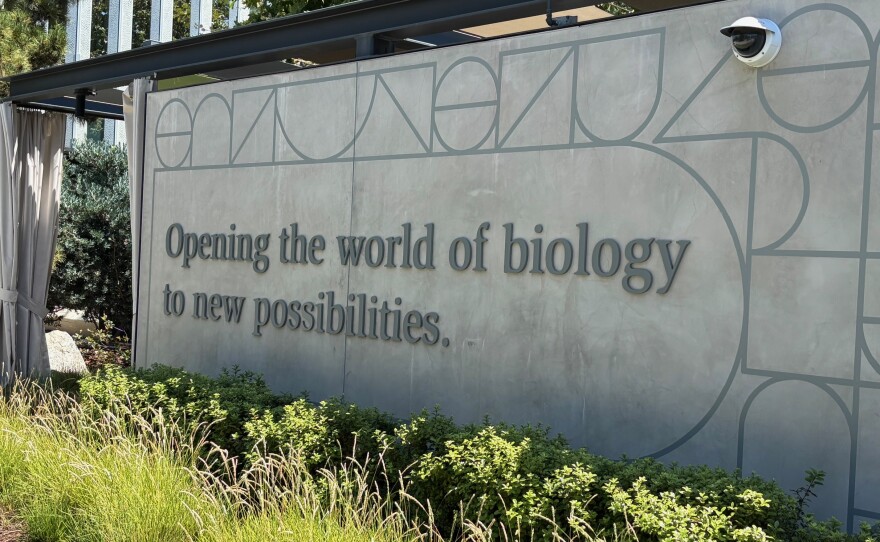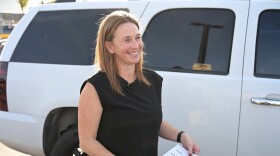San Diego has been a powerhouse when it comes to genetic sequencing. But industry leader Illumina is being challenged by an eight-year-old startup, led by a woman who was once on Illumina’s payroll.
Molly He is the co-founder and CEO of Element Biosciences. She and two partners began the company eight years ago.
We spoke in a sunny conference room at their Sorrento Valley headquarters. There, she said building a new company from nothing was a result of what drives her.
“I think after so many years in this industry, I started to understand myself better. And I have the self-awareness that I don’t like to be bored,” she said. “And if there’s something that is going very routine and incremental, I just check out."
After checking in as entrepreneur, she and her partners have cumulatively raised $675 million to get Element where it is today. Today she says Element has grown to a company with 400 employees and $60 million in revenues in 2024.
The history of Molly He began in China.
Her parents were teachers and intellectuals who got on the wrong side of Chairman Mao's cultural revolution. Their family was relocated to what she calls a remote fishing village that was very poor. Even so, as a child she said she was in an inspiring environment.
“We didn’t have hot water, not even running water. We didn’t have heat in the winter. But we were very rich in education. Because I grew up in a teacher campus or compound. My parents were mathematics teachers. And I grew up with all of the teachers’ kids. So the education environment was amazing,” she said.
Molly He managed to come to the U.S. after college and got a PhD in protein biophysics at UCLA. She spent eight years at Illumina and did a brief stint working for a venture capital firm.
Element Biosciences makes a genetic sequencing machine called the AVITI.
“DNA sequencing is reading genetic codes in any living organism. It could be human. It could be plants. It could be animals. It could be microbes. Right?” she said. “So understanding the genetic makeup of these living organisms can tell you a lot about, in humans, do you have any predisposition for certain diseases.”
Molly He said Element’s customers include forensic labs that sample hair and blood to search for missing people. Fish farms that use DNA to create shrimp with bigger tails. Natural history museums that want to analyze their artifact collection for evidence of origin.
But she said improving the practice of medicine is the number one goal.
“The ultimate vision of Element Biosciences is to make precision medicine affordable,” she said. “Precision medicine. What that means is that every single person has a specialized medication for your disease … It’s because everybody’s genetic makeup is different, and everybody responds to the same drug differently.”

One of Elements' customers is the Salk Institute where plant geneticist and research professor Todd Michael is very familiar with Element’s AVITI platform. He said he and other colleagues in genomics centers believe Element sequencers have pulled ahead of competitors on price and quality.
Michael adds that Element has now taken sequencing to the next level where the target is much more than DNA.
“So I think Molly’s brilliance is to say now we can do this all on one platform. Let’s acknowledge that this is basically a molecular microscope, and let’s dig in. Let’s do protein. Let’s do RNA. Let’s look at the spatial context of the cell and boom! We have everything all in one,” Michael said.
The next generation of sequencing devices at Element Biosciences is called the AVITI24, and it looks for a lot more than DNA.
Eric Topol is director of Scripps Research and prominent advocate of precision, or he calls individualized medicine. He said systems like the AVITI24 focus on what’s called spatial biology and medicine. And the comprehensive way they help to understand human tissue may be the hottest thing in life sciences today.
It can discover crucial biomarkers, for one.
“Also understanding mechanisms of disease. Discovering new types of cells that we never knew about. So it’s really advancing the field and there’s no question that it is center stage in terms of life science work right now,” Topol said.
Asked what her work and career have taught her, Molly He said if you’re going to be an entrepreneur you need naive enthusiasm and lots of energy.
“The path of being an entrepreneur is really, really hard. You not only need the passion. You need stamina. Because it’s a constant climb,” she said. “It’s not like, ‘Hey, I reached a milestone. Now I can celebrate.’ No, because you don’t have time to celebrate!”
Molly He, however, did find time for a family. She has two daughters.
She credits companies like Illumina with creating a sequencing industry and an educated customer base. She said, using air quotes, “all Element had to do” was create a machine that could do it faster, better and cheaper.”





